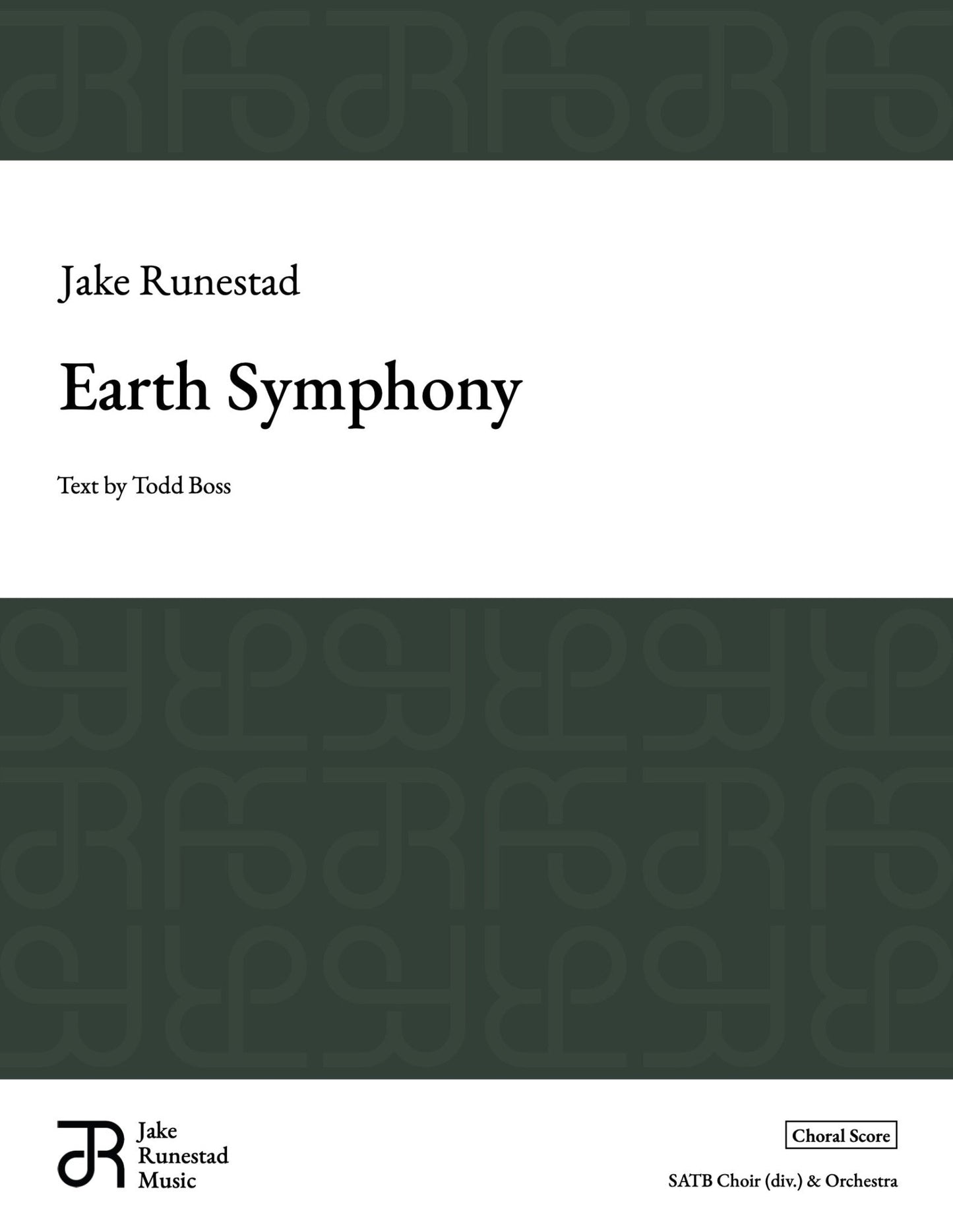SKU:JR0088
Earth Symphony
Earth Symphony
Couldn't load pickup availability

"Runestad's rich deployment of thematic motifs and
choral-orchestral colors makes this...a forceful social statement."
— Gramophone
Composer Jake Runestad speaks to Naxos Classical about Earth Symphony:
| About |
"Earth Symphony," the EMMY® award-winning, ground-breaking choral symphony from composer Jake Runestad and librettist Todd Boss, is a 5-part dramatic monologue from the voice of a post-anthropocene Mother Earth. The work imagines Earth’s hope for humanity, her discovery of its power, her ruination at its hands, her lament at its loss, and her recovery. By anthropomorphizing Earth herself, drawing on the familiar earth-mother trope, "Earth Symphony" enables entry into our own ecological shame, guilt, responsibility, potential, and redemption, all from a wide-angled, time-telescoped lens, thereby asking our most immediately pressing environmental questions in an entirely new way. |
| Instrumentation | SATB Chorus & Orchestra 2.2.2.2, 4.2.3.1, Timp. + 2 (or 3) Percussion, Harp, Piano, Chorus, Strings |
| Duration | 35:00 |
| Year Completed | 2021 |
| Premiere |
February 25, 2022. True Concord Voices & Orchestra. Eric Holtan, conductor. Recent Performances: - Munich Radio Orchestra & Bavarian Radio Choir - Grant Park Symphony and Chorus (Millennium Park, Chicago) - Bilbao Symphony Orchestra - ACDA National Conference (Meyerson Symphony Center. Baylor Symphony Orchestra, choirs from UT Arlington, TU San Antonio, and Baylor Univ. Jake Runestad, conductor) - National Chorus of Korea & Orchestra |
| Text | EARTH SYMPHONY Libretto by Todd Boss (Spanish Translation Available Here) I. Evolution Forever alone — Then you were born: You scorned the odds Mirabilia! You were my light. Never shall I dare to dream
And how are you fallen so Do you remember Icarus, There he is — in memory’s eye — [Icarus:] O, joy — so much I am a dream! How small she is — the blue- The sun. [Earth:] Yes I remember Icarus, So fell humanity. So fell I.
Terrore atmosphaera! You dam my I am rage! I am war! Mirabilia! What have you done,
Sleep now, my children, now your days are done. Sleep now, forever, lofted in time. Mirabilia! Sleep now, my children, my wonder, my light. Mirabilia! Sleep now, my children, though the cradle fall. Mirabilia!
Alone forever, Empty Dormant No. I shall not go alone. None shall weep,
and none shall witness, Slowly, in the shell of a factory, and none shall weep. There shall come a day Mirabilia, |
| Suggested Programming |
Holst: The Planets Runestad: Earth Symphony |
| Program Note |
Earth Symphony Music by Jake Runestad (b. 1986) Libretto by Todd Boss (b. 1968) Completed in December 2021. Over hundreds of years of musical creation, composers developed the symphonic form into a potent, large-scale framework for exploring profound ideas. The sheer number of musicians involved and long duration of the work, allow the time, space, and sonic possibilities for a significant musical journey. For this commission from True Concord Voices & Orchestra, I knew that creating a large work for these forces would necessitate a significant story to tell — one of relevance and power, drawn from our beautiful and complex human experiences. Everyday we hear of more fires, floods, hurricanes, droughts, tsunamis, extinctions, and diseases that impact life around the globe. The earth is changing, due to the impact of human behavior, and how we respond to these changes will determine the survival of our species. Through brainstorming with my frequent collaborator, poet/librettist Todd Boss, we decided that giving voice to Mother Earth would be a powerful approach for this piece. Todd created a sweeping, gorgeous, and compelling five-part monologue of a mother telling the history of her children — how they admired her, harmed her, and ultimately how she recovered. Her story begins in a pre-life genesis that tracks the evolution of humans, whose apprehension of Earth’s laws endear them to her as nothing short of miraculous (her beloved “Mirabilia”). Movement 1: “Evolution” hints at the musical themes of each subsequent section and establishes a sonic relationship between Earth (D Major) and humankind (Eb Major), which is explored throughout the work. Movement 2: “Ambition" dramatizes humanity’s fall from grace by retelling the Greek myth of Icarus and harkening to ancient instruments and melodies (including the Seikilos Epitaph — the oldest, complete musical composition yet discovered). Movement 3: “Destruction” charges through a series of ecological cataclysms — forest fire, storms, earthquakes — illustrated by growling brass, raging percussion, and shrieking woodwinds. Movement 4: “Lament” expresses Earth’s grief in a loving farewell to humanity that echoes Henry Purcell’s 17th-century aria, “When I Am Laid in Earth” (Dido’s Lament), and its iconic descending bass-line chaconne. Movement 5: “Recovery” finds Earth restoring balance and moving on, into a deep spacetime like the one from which she emerged. By anthropomorphizing Earth herself, drawing on the familiar earth-mother trope, "Earth Symphony" enables entry into our own ecological shame, guilt, responsibility, potential, and redemption, all from a wide-angled, time-telescoped lens, thereby asking our most immediately pressing environmental questions in an entirely new way. |
| Community Engagement |
Ensembles are encouraged to engage in community impact activities surrounding the performance of “Earth Symphony.” For the world premiere in Tucson, AZ, composer Jake Runestad secured a $5,000 gift from a generous donor to help offset the carbon footprint of the performance, and to support a local organization that works toward sustainability. The gift was made to the Community School and Garden Program which connects students in public schools with Tucson’s 4,000-year agricultural legacy by planting, maintaining, and engaging in school gardens. Using gardens as dynamic educational tools, they help cultivate community, connect students with their local food system, and use gardens as STEM learning labs. |

